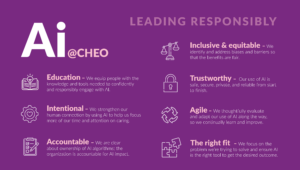Live Projects:
ThinkRare- Harnessing AI for early identification of rare genetic diseases.
Viral Volume Forecasting- Using AI to forecast RSV and influenza peak season volumes at CHEO.
Projects in Development:
SmartER (Mental Health OneVisit)- The smartER AI tool will help you identify children and youth who are likely to return to the Emergency Department (ED) for mental health reasons within six months of their first visit, proactively reducing the need for repeat visits to the ED.
AIRE KIDS- Artificial Intelligence for predicting ED visits in the KIDS with Asthma. predicting which kids seen at the ED for asthma will likely have a future asthma visit within one year and refer them for asthma self-management education and specialized care.
Organ Donation Advisor Tool- Every second counts when it comes to successful organ transplantation, we we are using AI to better predict time to death and improve post transplantation organ function and the end-of-life experience for donor families.
AI Powered Laparoscopic Simulator- Working in collaboration with Carleton University engineering students, CHEO researchers are incorporating machine learning into a laparoscopic simulator to help train the future of pediatric surgeons.
Early Detection of Autism using BORN Data- Leveraging AI to predict which children and youth will need to be evaluated for autism spectrum disorder. leading to earlier identification and tailored care.
Synthetic Data to Protect Patient Privacy and Fuel Research- Using generative AI to accelerate research on patient data by enabling data sharing between institutions in a privacy protected way, balancing data sets to reduce bias in algorithm development.
Related News
-

19/11/2025
AI-powered insights could help youth get the right care sooner for eating disorders
-

10/11/2025
Leveraging AI and neuroimaging to advance pediatric concussion care; focusing on mental health
-

22/07/2025
AI predictive screening shows potential to provide earlier and more accurate detection of autism spectrum disorder
Research Projects
-
Transformer-based deep learning ensemble framework predicts autism spectrum disorder using health administrative and birth registry data.
07/04/2025
Early diagnosis and access to resources, support and therapy are critical for improving long-term outcomes for children with autism spectrum disorder (ASD). ASD is typically detected using a case-finding approach based on symptoms and family history, resulting in many delayed or missed diagnoses.
-
Augmenting Insufficiently Accruing Oncology Clinical Trials Using Generative Models: Validation Study
03/03/2025
Recruiting a sufficient number of patients for clinical trials is challenging [1], and the inability to recruit participants is the cause of failure for many clinical trials [2]. Approximately, 25% of clinical trials are discontinued before completion [3], with insufficient recruitment being the most frequent reason in 31% of the cases [4]. For adult cancer trials, between 20% and 50% fail to complete or were unable to reach recruitment goals [5-9]. This has been exacerbated by the recent pandemic where many trials experienced a considerable reduction in recruitment rates [10-13], which has continued after the pandemic [12]. While poor accrual is a problem in all trials, it is a greater problem in government (ie, academic) sponsored trials [14,15]. When a study is unable to recruit a sufficient number of patients, the study can be stopped, and the relevant analyses are performed on the available data. However, not reaching accrual targets results in underpowered analyses, and the smaller sample sizes increase the risk of unstable parameter estimates.
Researchers
-
Kasim Abdulaziz
Investigator, CHEO Research Institute
-
Christine Armour
Investigator
-
Kym M Boycott
Senior Scientist, CHEO Research Institute
-
Khaled El Emam
Senior Scientist, CHEO Research Institute Professor, Faculty of Medicine, University of Ottawa
-
Jeff Gilchrist
Associate Scientist, CHEO Research Institute
-
Jean Ngoie
Investigator, CHEO Research Institute
-
Dhenuka Radhakrishnan
Scientist, CHEO Research Institute








